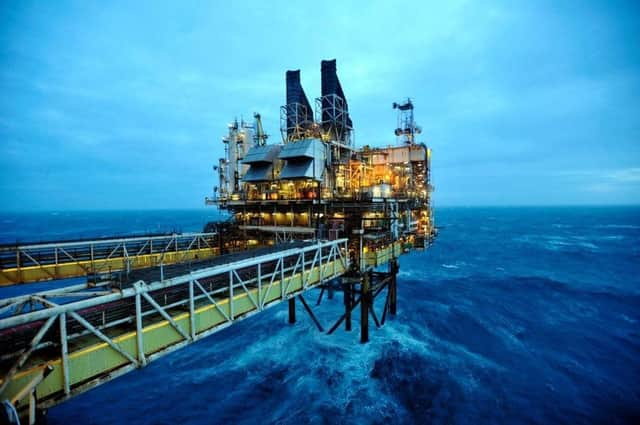New licensing round for oil and gas exploration in the North Sea "good for the environment” insists UK climate minister Graham Stuart


The UK Government Cabinet minister made the claims as the UK opened a new licensing round for companies to explore for oil and gas in the North Sea. in a decision that is at odds with international climate scientists who say fossil fuel projects should be closed down
Licences are being made available for sectors of the North Sea – known as blocks – with the North Sea Transition Authority (NSTA) estimating that over 100 may be granted.
Advertisement
Hide AdAdvertisement
Hide AdNearly 900 locations are being offered for exploration, with as many as 100 licences set to be awarded in a bid to encourage production of new oil and gas supplies as quickly as possible.
The NSTA has identified four “priority cluster areas” in the Southern North Sea.
Speaking to BBC Breakfast on the new licenses, Graham Stuart said on the exploration: “Actually it’s good for the environment, because when we burn our own gas it’s got lower emissions around its production than foreign gas … as well as supporting British jobs.”
Mr Stuart added: “Our development is not going to affect our usage, our usage is determined by the framework of the Climate Change Act and the independent climate change committee which informs Government policy.
“So, you really can be assured that it’s actually – I know it sounds contradictory – but it’s actually good for the environment that we are going to produce more of our gas and oil at home.”
Asked about how a new licensing round for oil and gas exploration is compatible with climate targets, Mr Stuart said: “It’s entirely compatible.
“One thing for everyone to remember, as well as ensuring our energy security, which is a top priority for the Government, we have one of the lowest emitting production systems for oil and gas.
“So, as we are going to use oil and gas, and we will still be using about a quarter of the level of gas even in 2050 under our net-zero approach, just because we will net that out, then actually having our own domestic gas is good for the economy.”
Advertisement
Hide AdAdvertisement
Hide AdSpeaking to BBC Breakfast ahead of the SNP’s party conference in Aberdeen on Friday, Nicola Sturgeon said there has to be a transition away from oil and gas and accused the UK Government of “haphazard planning” over energy.
“In terms of new licences, I’ve been very clear that within the context of that just transition, we’ve got to subject any decisions about further exploitation of oil and gas to the most stringent climate checks.
“I worry right now that what we’re hearing from the UK Government is just a continuation of their haphazard planning about energy.
“In the long term, what they’re doing is undermining energy security, rather than strengthening it, because energy security, it’s difficult, it’s challenging, but the route to energy security is to secure that transition away from fossil fuels to renewable.”
The First Minister also asked Scottish people to be “sensible about their energy usage” this winter and said new oil and gas exploration should not happen on the whims of UK Government ministers.
Ms Sturgeon told BBC Radio 4’s Today programme: “There is real concern to people about energy supplies over the winter period.
“We are seeing a lack of planning and basic communication from the UK Government. That’s particularly galling in a Scottish context because we are a net exporter of electricity. We generate sufficient renewable electricity to cover almost all of our domestic needs.
“We are part of the GB grid so we’re reliant on the UK Government taking good decisions itself. I think there needs to be, a bit like during Covid, candid explanations to people about the challenges we’re facing, good advice to people about what we’re asking them to do.”
Advertisement
Hide AdAdvertisement
Hide AdBusiness and Energy Secretary Jacob Rees-Mogg has also insisted that the new licensing round for oil and gas exploration will boost both the UK’s economy and energy security,
Speaking ahead of the process getting under way, Mr Rees-Mogg said: “Putin’s illegal invasion of Ukraine means it is now more important than ever that we make the most of sovereign energy resources, strengthening our energy security now and into the future.
“Ensuring our energy independence means exploiting the full potential of our North Sea assets to boost domestic production – recognising that producing gas in the UK has a lower carbon footprint than importing from abroad.”
Mike Tholen, acting chief executive for industry body Offshore Energies UK (OEUK), said: “The UK gets 75% of its total energy from gas and oil so producing our own reduces our vulnerability to global shortages of the kind caused by the Ukraine conflict.”
He added: “There is no conflict between issuing new licences and reaching carbon neutrality.
“Our industry is committed to net zero and also to helping build the low-carbon energy systems of the future. But this is a journey that will take decades during which we will still need gas and oil.
“Many existing UK oil and gas fields are in decline so the risk is that production will drop much faster than demand, leaving us more dependent on imports. That is why new licences are so important.
“New licences also help maintain continuity for the energy operators and for our vital supply chain companies which, between them, employ over 200,000 people.
Advertisement
Hide AdAdvertisement
Hide Ad“The success of this and the next licensing rounds will be vital for our nation’s long-term energy security and to ensure we deliver on the UK’s commitment to reach net zero by 2050.”
Intergovernmental Panel on Climate Change (IPCC), the global body for climate science and the International Energy Agency (IEA) have said that no new projects if there is to be a chance of keeping global temperature rises under 1.5C.
